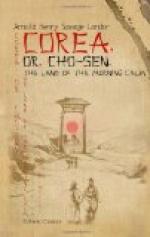The administration of the law in general is very strange. Some people are responsible, others are not. Certain tradesmen, like butchers, plasterers, innkeepers, carpenters, hatters, etc., have formed themselves into guilds, and in the case of offences committed by a member of one of these guilds he is held responsible to the head of the guild and not to the magistrates of the country. The same holds good in the case of the mapus (horsemen) and the coolie-carriers who constitute, probably, the best-formed and best-governed guild in the country. It has thousands of members all over the kingdom, and not only is the postal system carried on by them, but also the entire trade, so to speak, between the different provinces and towns of the realm. The chief of this guild, until late years, had actually the power of inflicting capital punishment on the members; now, however, the highest penalty he can inflict is a sentence of flogging. Thus it is, that a good deal of the justice of the country is administered by the people themselves, without the intervention of the legal authorities, in which respect they show themselves very sensible. The nobles, too, have the power of flogging their servants or followers, and this is usually done in their own compounds. Very often on passing a house the strokes of the paddle may be heard, the howls and screams of the victim testifying to the nature of what is going on. In other cases flogging is generally done in public, for then it is supposed to have more effect. If done in a private enclosure, then all the servants, soldiers and followers are summoned to witness it.
This patient submission to these personal punishments is no doubt one of the last remains of feudalism. In not very remote times, serfdom which bordered on slavery was still in existence in Cho-sen. Men and women became private property either by the acquiring of the land on which they lived, or, by purchase, or by way of execution for non-payment of debts, for under this convenient law creditors could be paid with a man’s relations instead of with ready money.
Slavery in Corea, even when it existed, was, however, always of a very mild form. The women were mostly employed as servants about the house, while the man tilled the ground, but in neither case was rough dealing the rule, and, far less, ill-treatment. They were, too, well fed and clothed; so much so, that many people used to sell themselves in order to acquire a comfortable living. In time of famine this must have very often occurred, and many families whose ancestors under such circumstances stood by the nobles and rich people are even to the present moment supported by them, though no longer as slaves, but rather as retainers and servants. They are perfectly happy with their lot and make no agitation for liberty; in fact, like the bird that has been born and bred in a cage, if left to themselves, they would probably soon come to a bad end.




